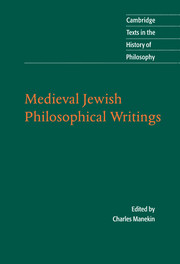Book contents
- Frontmatter
- Contents
- Introduction
- Chronology
- Further reading
- Note on the texts and translations
- 1 Saadia Gaon, from The Book of the Beliefs and Convictions
- 2 Solomon ibn Gabirol and Shem Tov b. Joseph Falaquera, Excerpts from “The Source of Life”
- 3 Moses Maimonides, from The Guide of the Perplexed
- 4 Isaac Albalag, from The Emendation of the “Opinions”
- 5 Moses of Narbonne (Narboni), The Treatise on Choice
- 6 Levi Gersonides, from The Wars of the Lord
- 7 Ḥasdai Crescas, from The Light of the Lord Treatise Two
- 8 Joseph Albo, from The Book of Principles
- Index
- CAMBRIDGE TEXTS IN THE HISTORY OF PHILOSOPHY
6 - Levi Gersonides, from The Wars of the Lord
Published online by Cambridge University Press: 05 June 2012
- Frontmatter
- Contents
- Introduction
- Chronology
- Further reading
- Note on the texts and translations
- 1 Saadia Gaon, from The Book of the Beliefs and Convictions
- 2 Solomon ibn Gabirol and Shem Tov b. Joseph Falaquera, Excerpts from “The Source of Life”
- 3 Moses Maimonides, from The Guide of the Perplexed
- 4 Isaac Albalag, from The Emendation of the “Opinions”
- 5 Moses of Narbonne (Narboni), The Treatise on Choice
- 6 Levi Gersonides, from The Wars of the Lord
- 7 Ḥasdai Crescas, from The Light of the Lord Treatise Two
- 8 Joseph Albo, from The Book of Principles
- Index
- CAMBRIDGE TEXTS IN THE HISTORY OF PHILOSOPHY
Summary
The third treatise, concerning God's knowledge (blessed be He) of [sublunar] things, is divided into six chapters:
Chapter 1, in which we mention the views of our predecessors concerning this question.
Chapter 2, in which we mention the arguments that establish each view according to what we have found in the statements of their proponents, or their import.
Chapter 3, in which we investigate whether the arguments that Maimonides brings [to rebut the philosophers] are sufficient or not.
Chapter 4, in which is completed the discourse concerning God's knowledge of things, and is shown that there is nothing in our predecessor's arguments that rejects what has become evident to us regarding this knowledge.
Chapter 5, in which is shown fully that what we have understood of this knowledge is most apt in every respect.
Chapter 6, in which is shown that the view to which speculation has led us is that of the Torah.
Chapter One
We ought to investigate whether or not God knows particular possible sublunar things and, if He does know them, in what way He knows them. Since the philosophers and the Torah sages are divided on this question, we should investigate first their views. Whatever we find to be correct we shall adopt. Whatever we do not find to be correct we shall, when refuting it, explain in what respect it is true.
- Type
- Chapter
- Information
- Medieval Jewish Philosophical Writings , pp. 153 - 191Publisher: Cambridge University PressPrint publication year: 2008

